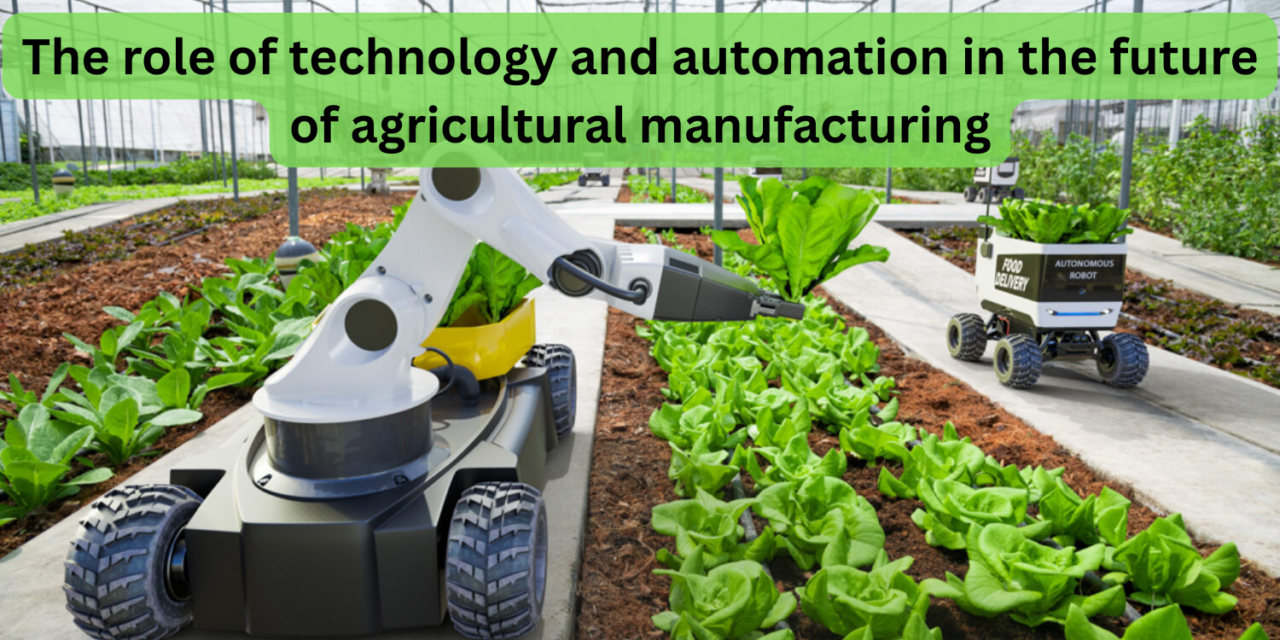Technology and automation are expected to play a pivotal role in the future of agricultural manufacturing by increasing efficiency, reducing labor costs, enhancing product quality, and ensuring sustainability. Here’s a breakdown of the key roles they will play:
1. Increased Efficiency and Productivity
- Precision Agriculture: Technologies like GPS-guided equipment, drones, and sensors enable farmers to monitor and manage crops more precisely. Automated systems can optimize irrigation, fertilizer application, and pest control, leading to more efficient use of resources and increased crop yields.
- Robotics in Harvesting: Automated harvesters and robots are being developed to pick crops like fruits and vegetables more quickly and efficiently than human labor. This reduces labor costs and ensures consistent harvesting, even during peak seasons.
2. Improved Quality Control
- AI and Machine Learning: AI and machine learning algorithms are already being used in food processing plants to monitor production lines in real-time. They can detect inconsistencies in product quality, like color, shape, or texture, ensuring that only the highest quality products make it to the market.
- Smart Sensors: Advanced sensors can monitor factors like temperature, humidity, and pressure throughout the manufacturing process. This allows for real-time adjustments, ensuring that the final product meets safety standards and quality requirements.
3. Automation in Processing and Packaging
- Automated Food Processing: Automation is already transforming the food processing sector by reducing the need for manual labor. Machines can handle tasks such as slicing, sorting, mixing, and packaging at a much higher speed than human workers. This increases production rates and reduces errors associated with manual work.
- Robotic Packaging Systems: Robotic systems can automate packaging, labeling, and palletizing, improving efficiency and consistency in the packaging process. Automation in packaging also helps address labor shortages, which have become an issue in many agricultural sectors.
4. Enhanced Data Collection and Analysis
- Big Data and IoT: The Internet of Things (IoT) and big data analytics are transforming agriculture and food manufacturing by collecting large volumes of data from farms, processing plants, and supply chains. These data points can be analyzed to optimize crop management, predict harvest yields, track inventory, and monitor supply chain performance.
- Supply Chain Optimization: With advanced data analytics, manufacturers can predict demand more accurately and streamline production and distribution. This helps reduce waste, ensure timely deliveries, and balance supply with demand more efficiently.
5. Sustainability and Resource Management
- Energy Efficiency: Automation can optimize energy consumption in food manufacturing processes. For instance, smart systems can adjust energy use based on real-time demand, reducing waste and helping manufacturers lower their carbon footprints.
- Waste Reduction: Technologies like AI, machine learning, and sensor-based systems can help identify areas in the production process where waste is being generated, whether it’s raw materials, energy, or water. This information can then be used to adjust processes to minimize waste and improve sustainability.
6. Traceability and Food Safety
- Blockchain Technology: Blockchain offers the potential for enhanced traceability in the agricultural supply chain. By tracking each step from farm to table, consumers and manufacturers can ensure the authenticity and safety of the products. This is particularly important for organic and high-value food products, where traceability is crucial for quality assurance.
- Smart Packaging and QR Codes: Smart packaging equipped with sensors or QR codes allows consumers and manufacturers to track the freshness, condition, and safety of products. This technology can help ensure food safety by monitoring for any contamination or temperature fluctuations during storage and transport.
7. Labor and Cost Efficiency
- Reduction in Labor Costs: Automation can help reduce labor costs by replacing manual labor with machines. For example, automated sorting, grading, and packaging systems can handle repetitive tasks more efficiently than human workers, reducing labor costs and increasing consistency.
- Labor Shortages: In many agricultural sectors, labor shortages are becoming a challenge, particularly in regions that rely heavily on seasonal migrant workers. Automation helps fill this gap by providing an alternative to human labor, enabling manufacturers to maintain production levels during labor shortages.
8. Customization and Product Innovation
- Consumer Demand for Personalized Products: With automation and data analysis, manufacturers can more easily produce customized or specialized food products in smaller batches to meet changing consumer demands, such as plant-based or allergen-free foods. This flexibility allows agricultural manufacturers to diversify their product offerings.
- Smart Manufacturing: Technologies such as 3D printing are being explored to create customized food products, and AI-driven systems allow for rapid experimentation with new recipes or formulations, fostering innovation in the food industry.
9. Climate Resilience and Adaptation
- Climate-Smart Agriculture: Technology can help manufacturers adapt to changing climates by enabling more resilient farming practices. For example, precision irrigation systems and climate-controlled greenhouses can help mitigate the impacts of droughts or temperature fluctuations, ensuring a steady supply of raw materials for food processing.
- Genetic Engineering and Biotechnology: Advances in biotechnology and genetic engineering allow for the development of crops that are more resistant to pests, diseases, and extreme weather conditions. These innovations can ensure a stable supply of agricultural products, even in the face of climate-related challenges.
10. Global Collaboration and Integration
- Connected Supply Chains: Automation and technology enable manufacturers to integrate and connect with global supply chains more effectively. This allows for better coordination between different stages of production, from farming to processing to distribution, reducing inefficiencies and improving overall supply chain management.
- Collaboration with AgTech: Agricultural technology companies (AgTech) are increasingly collaborating with food manufacturers to develop new technologies for crop production, food processing, and sustainability. This collaboration is driving innovation and improving efficiency across the agricultural sector.









